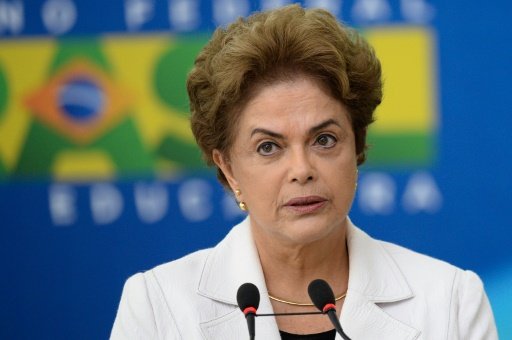Brazilian President Dilma Rousseff reacted angrily on Thursday at the leaking of testimony to the media after a newsweekly published allegations that link both, her and her mentor, ex-President Luiz Inacio Lula da Silva, to a giant corruption probe roiling Brazil.
Senator Delcidio do Amaral, ruling party, who is a key legislative ally for Roussef, was arrested last November on charges of involvement in a vast embezzlement and bribery conspiracy at national oil company Petrobras. The magazine IstoE reported that before Delcidio was arrested, he allegedly tied the president and her predecessor to the scandal engulfing state oil company Petrobras in a 400-page statement made to prosecutors.
In a statement issued by her office, Rousseff condemned the widespread use of leaks as a political weapon. She said that “Apocryphal, selective and illegal leaks should be repudiated and rigorously investigated because they undermine the law, justice and truth”.
If the IstoE revelations were confirmed, they would complicate efforts by Rousseff, already coping with deep recession and political gridlock, to weather the kickback probe that has toppled dozens of corporate executives and drawn ever closer to her inner circle. Amaral said in a statement he could not vouch for the authenticity of documents cited by IstoE, but did not deny seeking leniency from prosecutors in return for information.
Allegations that bribes were used to finance Rousseff’s 2014 re-election campaign are at the center of a judicial effort to invalidate her victory. On the suspicion that Rousseff’s campaign strategist was paid with graft money, he resides currently in jail. Brazilian markets ascended as investors guessed that the scandal could topple a leftist government known for interventionist policies that economists say led Brazil toward recession, an onerous deficit and growing debt levels.
Infact while the Bovespa stock index jumped 5.4 percent, the real currency rose more than 2 % against the dollar.
Aloysio Nunes, opposition leader of the PSDB party, who is actually under investigation for suspected corruption, called for Rousseff’s resignation.
The government scrambled to contain the damage by questioning the credibility of a politician who is being prosecuted and faces expulsion from the party and the Senate. Istoe reported that after more than three months residing in jail, Amaral was released on Feb. 19, marking days after his plea statements to prosecutors.
On the matter, attorney General Jose Eduardo Cardozo told reporters “If this plea bargain exists, Senator Amaral is lying through his teeth … to get out of jail and save his seat in the Senate”.
Worth mentioned that the senator reportedly testified that Rousseff took advantage of her influence to keep directors suspected of corruption in positions at Petroleo Brasileiro SA, as Petrobras is formally known. The probe has uncovered how main contractors arranged to pay kickbacks to company executives, political parties and elected officials in exchange for work.
IAmaral testified that Rousseff tried on three occasions to use the justice ministry to interfere in the Petrobras probe and get suspects released from prison, said Istoe. Amaral reportedly detailed illegal funding of Rousseff’s 2010 election campaign and said she knew all about the purchase of a refinery in Pasadena, Texas, that cost Petrobras many times more than it was worth.
Rousseff was accused by Amaral of appointing a favorable Supreme Court justice to help avert conviction of some directors and statesmen under investigation for bribes and kickbacks at Petrobras, added Istoe. Amaral also said Lula had knew very well of the bribery and political kickback scheme, which siphoned billions of dollars off overpriced contracts with Petrobras, and attempted to block prosecutors from investigating it, according to IstoE.
Until the Supreme Court approves the plea bargains as valid evidence the public prosecutor’s office said it could not comment on then. Lula’s foundation said in a statement that the former president had never committed any illegal acts as president, nor before and after being in office.
Federal prosecutors suspecting that Lula, who founded the Workers’ Party and was president from 2003 until 2010, received undue favors while in office from engineering firms they are probing, thus have put the latter under investigation. His standing as Brazil’s most popular politician has been deformed by another probe that involves a beach-front penthouse and country estate that were allegedly renovated for him by OAS and Odebrecht, two of the builders implicated in the Petrobras scandal. He denies ownership of the properties.
What had been welcome news for Rousseff, just a day earlier, is now overshadowed by Thursday’s allegations, as the Supreme Court voted to indict her archenemy, lower house speaker Eduardo Cunha, on related corruption charges.
Cunha’s downfall would improve her chances of blocking an impeachment process he launched against her in December.

